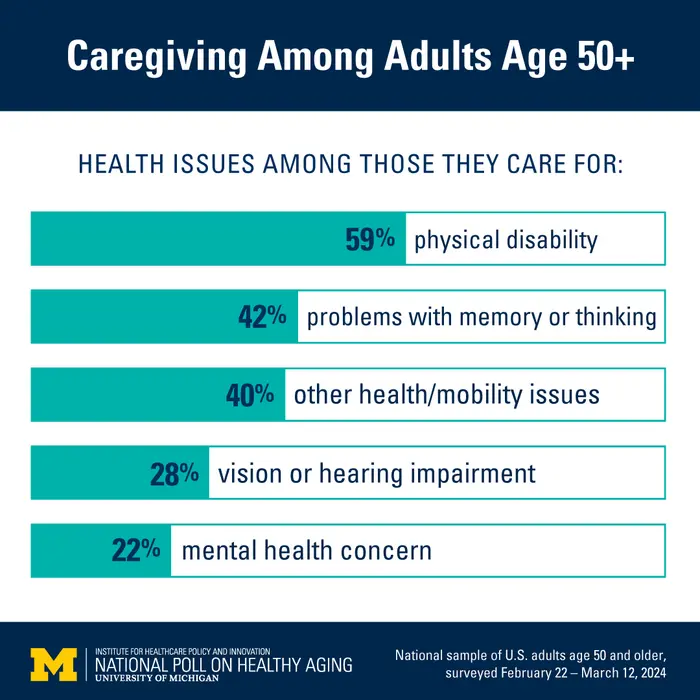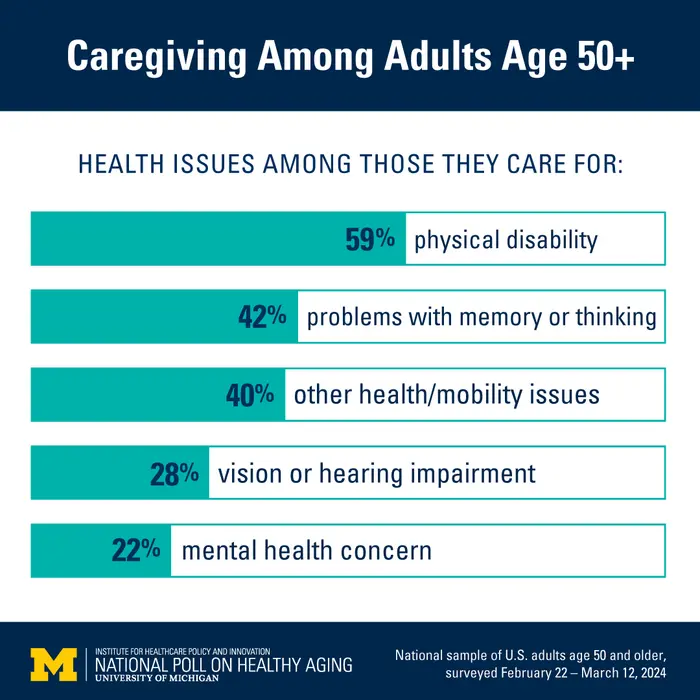More than 1 in 4 people age 50 and older helps take care of at least one family member or friend who has a health problem or disability, a new poll finds.

Credit: University of Michigan
More than 1 in 4 people age 50 and older helps take care of at least one family member or friend who has a health problem or disability, a new poll finds.
And among those caregivers, the new results from the University of Michigan National Poll on Healthy Aging reveal a lot about who they are and who they’re caring for.
In all, 30% of all people in their 50s and early 60s provide care to at least one person with a health issue or disability, compared with 23% of people over 65. And 1 in 10 caregivers in their 50s and early 60s are juggling taking care of three or more people.
In addition to differences by age, there was also a gender divide: 32% of women age 50 and over act as caregivers to someone with a health issue or a disability, compared with 22% of men in this age group.
The poll also reveals more about who caregivers age 50 and older are caring for.
In all, 23% of caregivers are caring for an adult or child with an intellectual or developmental disability, and 66% are caring for a person age 65 or older.
The most common health issue or disability that caregivers help their friends or family with was a physical disability or mobility problem, at 59%. The next most common was memory or thinking issues, at 42%, followed by vision or hearing impairments at 28%, and mental health concerns at 22%. Beyond these specific types of issues, 40% of caregivers said they care for someone with another condition. Caregivers could choose all conditions that apply to all the people they care for.
Views on caregiving cost responsibility
The poll asked all respondents who they think should take the lead when it comes to covering the cost of caregiving for people over age 65. In all, 45% of people 50 and older feel the government should take the lead, while 27% believe it should be the person receiving care, 18% think it should be family or friends, and 10% said it should be other sources.
However, caregivers were more likely to think the government should take the lead in covering the cost of caregiving for older adults (51%) than those who do not provide regular care to a person with a health issue or disability (42%).
The same was true for those in the lower end of the poll’s age range: 48% of people in their 50s and early 60s feel the government should take the lead in paying for caregiving of older adults, compared with 41% of people over 65.
The gender divide on this issue was slightly larger at 49% of women vs. 41% of men, while Black respondents were much more likely than others to support this view, at 63% vs. percentages in the low 40s for other racial groups.
Reflecting on the findings
The poll is based at the U-M Institute for Healthcare Policy and Innovation and supported by AARP and Michigan Medicine, U-M’s academic medical center. Additional funding from the Michigan Health Endowment Fund supported a Michigan-specific analysis of caregiver data, via the Michigan Poll on Healthy Aging.
“Nationwide, these data confirm that caregiving for family and friends who have health challenges falls unevenly on people in their 50s and early 60s, and women,” said Sarah Patterson, Ph.D., the U-M demographer who worked with the poll team on the new survey. “But they also show us more about the specific health issues and disabilities they’re helping loved ones with, and about the need for more awareness of existing support programs for older adults and their caregivers.”
Patterson is a research assistant professor at the U-M Institute for Social Research, in the Survey Research Center, and a member of IHPI.
The poll’s size means that of the nearly 3,400 people who answered the online survey, more than 900 are caregivers to at least one person with a health issue or disability – allowing for deeper analysis of their experiences.
“We hope these data will help policymakers and others understand who is providing care,” says poll director Jeffrey Kullgren, M.D., M.P.H., M.S., an associate professor of internal medicine at Michigan Medicine and physician and researcher at the VA Ann Arbor Healthcare System. “We also found that the majority of caregivers may not know about local or regional services that could help them or the person they’re caring for.”
Awareness of resources that could help
The poll shows that 61% of those providing care to family or friends with a health condition or disability don’t know about Area Agencies on Aging, or AAAs.
AAAs are local or regional organizations that can offer support to caregivers and to people over 65 and some people with disabilities. They receive some of their funding from the federal government, and most receive state and other funding.
Lack of awareness of AAAs was even higher among people who are not caregivers, at 70%. The poll team published more findings on awareness of aging resources earlier this year; find them at https://michmed.org/md4NQ.
Michigan findings
Just over 29% of Michiganders age 50 and older, and 35% of Michigan women age 50 and older, said they take care of at least one person with a health condition or disability.
Of the 344 Michiganders age 50 and older who said they are caregivers:
- 69% take care of someone over age 65
- 19% take care of someone with an intellectual or developmental disability
- 5% take care of three or more people
- Michigan caregivers were less likely than caregivers in other parts of the nation to say that they assist people with memory or thinking problems, at 32% vs. 43%
- The percentage of Michigan caregivers who provided care for a person was otherwise similar to the rest of the nation: physical disability or mobility issues (53%), vision or hearing problems (25%), mental health concerns (21%) and other health issues (37%)
- On the question of who should take the lead in covering the cost of caregiving for people age 65 and over, 47% of Michiganders said government, 26% said the person receiving care, 19% said family or friends, and 9% said other sources
- 51% of caregivers in Michigan were not familiar with AAAs
“These findings echo what I hear in my focus group-based research on caregiving, which is a need for more support and a lack of awareness of where to turn to get help with the demands of taking care of one or more loved ones,” says Patterson.
Poll sample details
The poll was a nationally representative survey conducted by NORC at the University of Chicago for IHPI and administered online and via phone in February and March 2024 among 1,079 Michigan older adults and 3,012 non-Michigan adults aged 50 to 101. The sample was subsequently weighted to reflect the U.S. and Michigan populations.
Read past National Poll on Healthy Aging reports and about the poll methodology.





